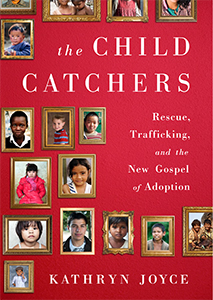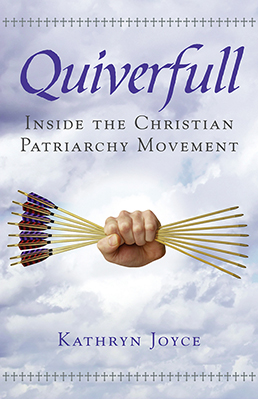A new review of the book is up at The Boston Globe, which calls The Child Catchers a “razor-sharp investigation into adoption” with “deep and devastating” reporting.
“Well-meaning people can enable tragedy with their good intentions,” Kathryn Joyce writes in this razor-sharp investigation into adoption. Although lauded as a humane and wholly positive solution to unwanted pregnancies (a “win-win” in popular rhetoric), domestic adoption too often involves manipulation, coercion, and intimidation of mothers, Joyce argues. She writes of a new emphasis on adoption in conservative Christian circles — often focusing on a Bible verse, James 1:27, that asks the faithful to look after widows and orphans — that has spawned a paradigm converting any unmarried pregnant woman into a birth mother, her child into an orphan (caring for widows is forgotten). During what’s now known as the Baby Scoop Era, which spanned from 1945 to 1972, societal stigma against single-motherhood and lack of birth control or abortion services combined to provide a steady stream of available babies. These days it’s much harder to get a single woman to relinquish a child for adoption; perhaps unsurprisingly, some Christian adoption agencies work (overtly or covertly) with so-called crisis pregnancy centers to recruit birth mothers. On the international front, American religiously-affiliated agencies warn of an “orphan crisis” and battle watchdog organizations who cite baby buying, forged documents, trafficking, and other abuses.
In her previous book, Joyce took on the so-called quiverfull movement, families who adhered to strict gender roles, eschew contraception, and pride themselves on mass-producing offspring. Her reporting here is similarly deep and devastating. Joyce is sympathetic to prospective adoptive parents, most of whom sincerely believe that they are rescuing an otherwise helpless orphan, and to birth mothers who felt discarded and degraded by the process by which they made another parent’s dreams come true. But for those who deride single mothers who keep their babies as “selfish” or justify dividing intact families in developing countries because “[w]e can’t compare first world families with third world families” — and especially those who make money by redistributing babies, like Bethany Christian Services, an evangelical adoption agency, which posted revenue of $75 million in 2011 — Joyce wields only righteous scorn.







